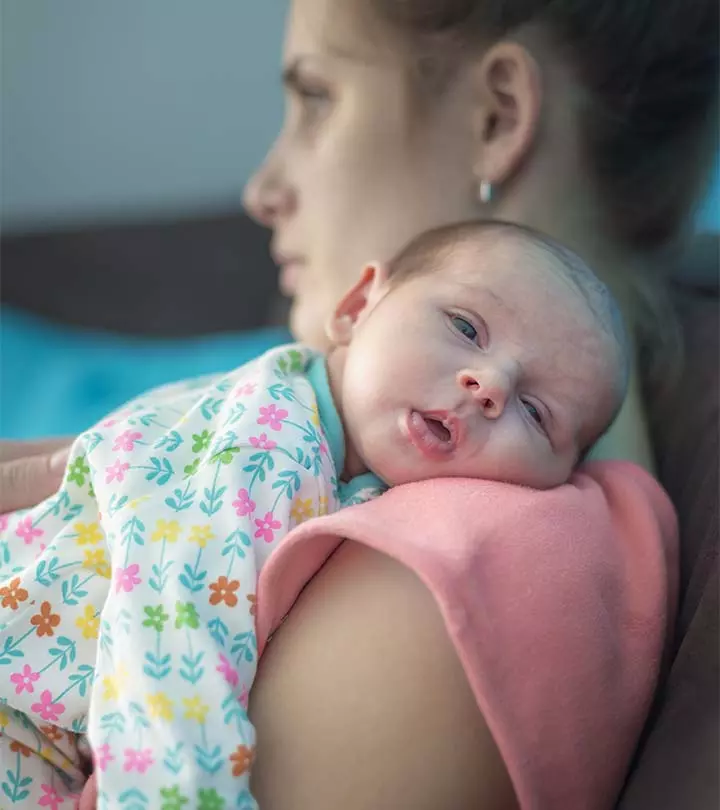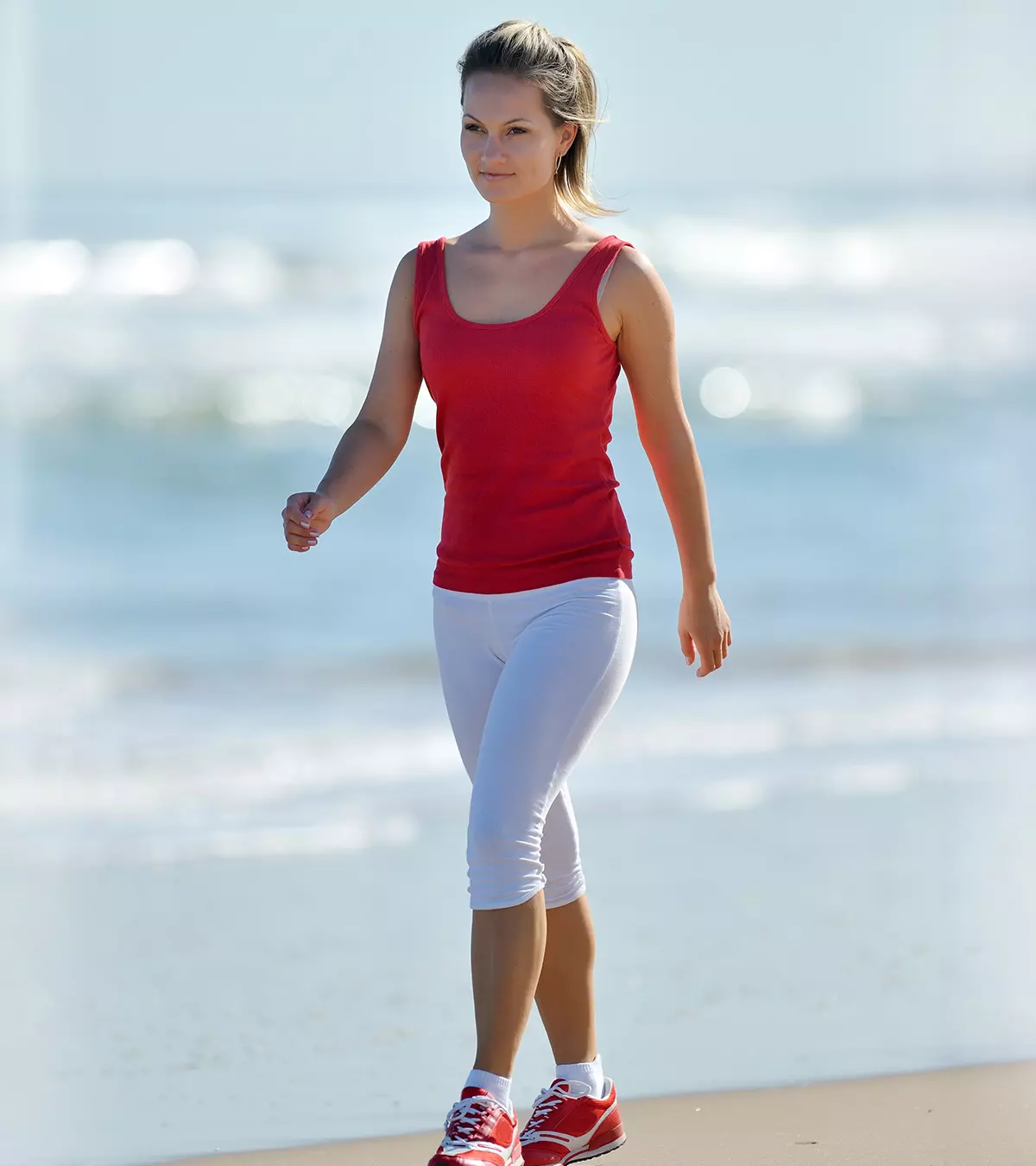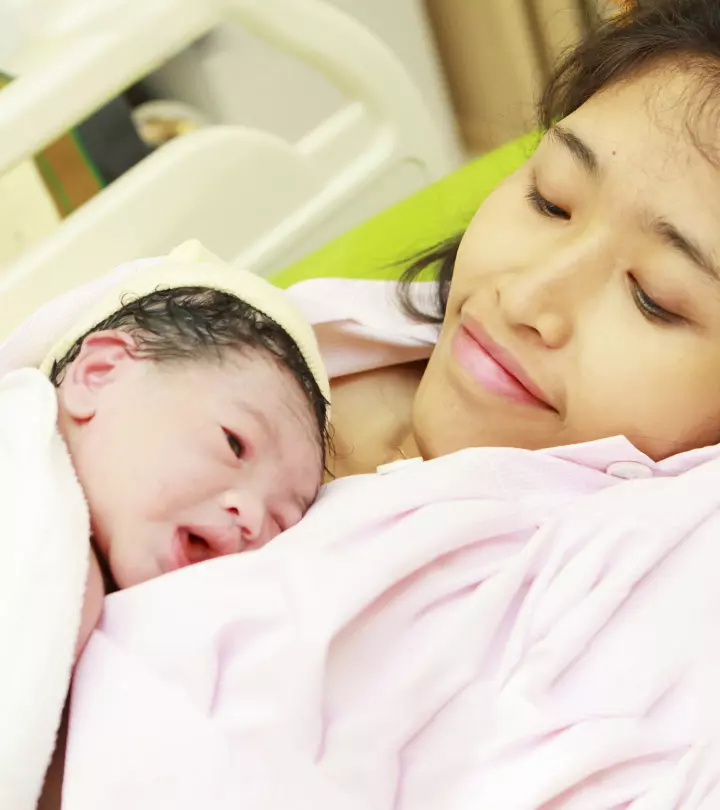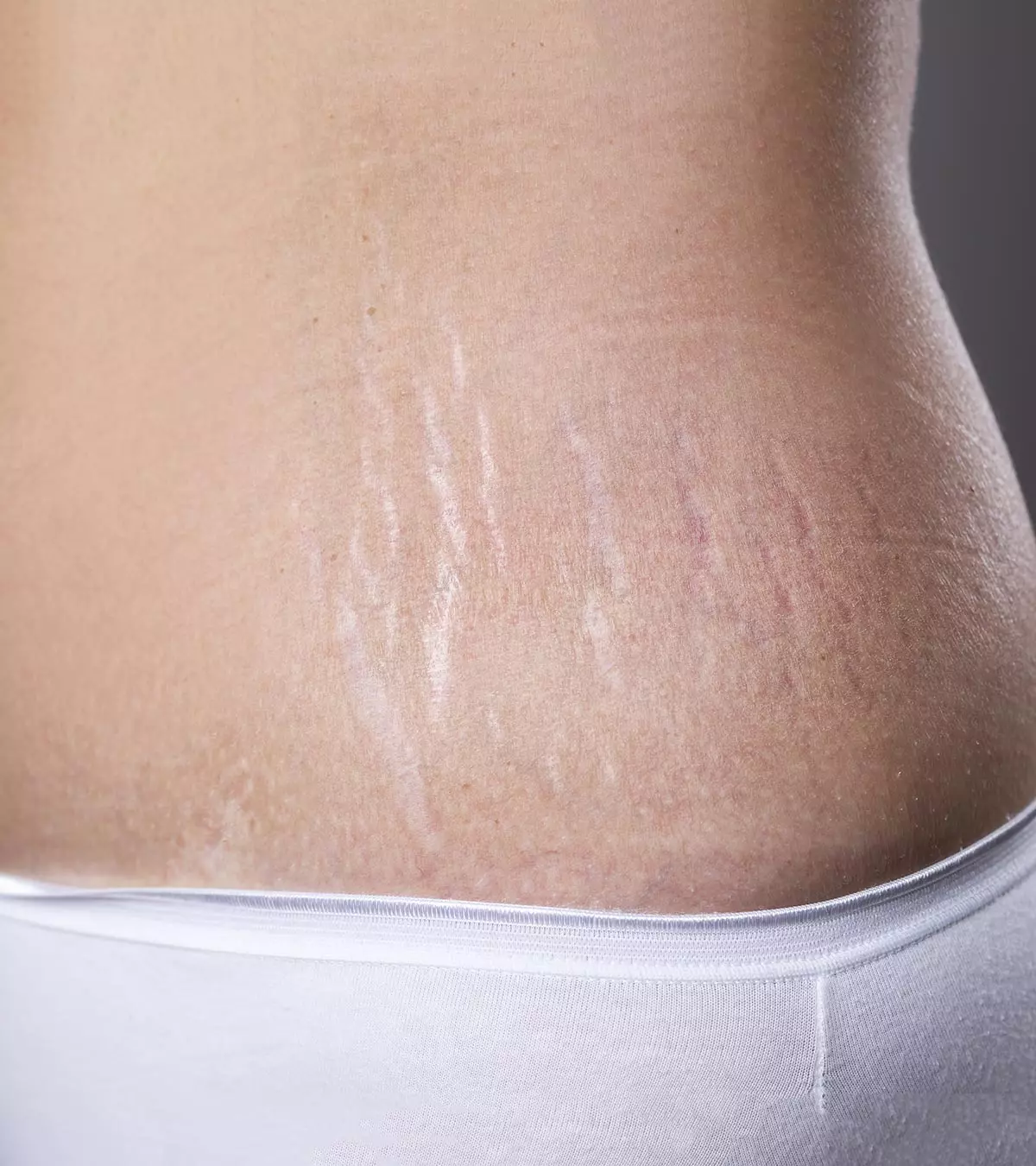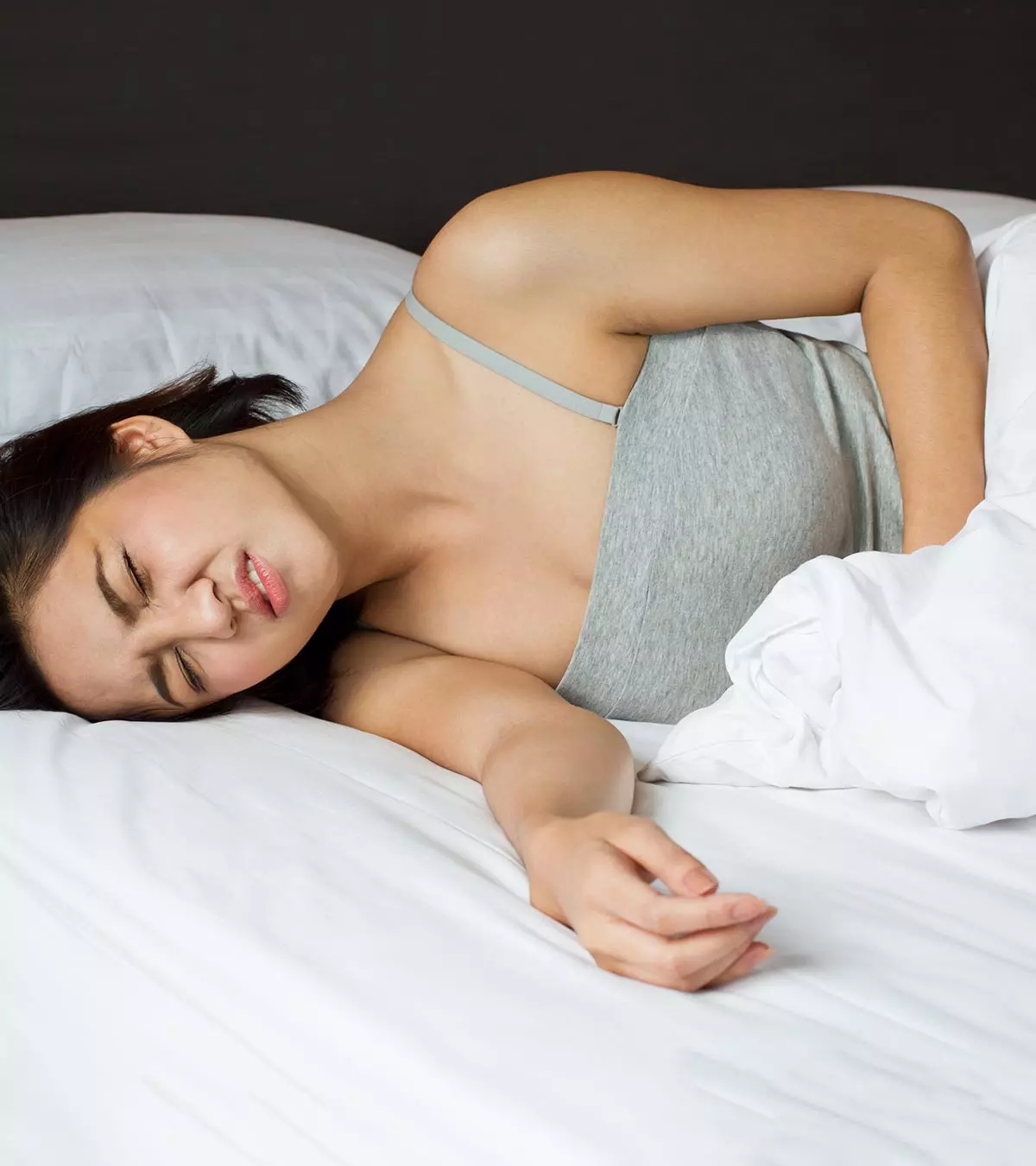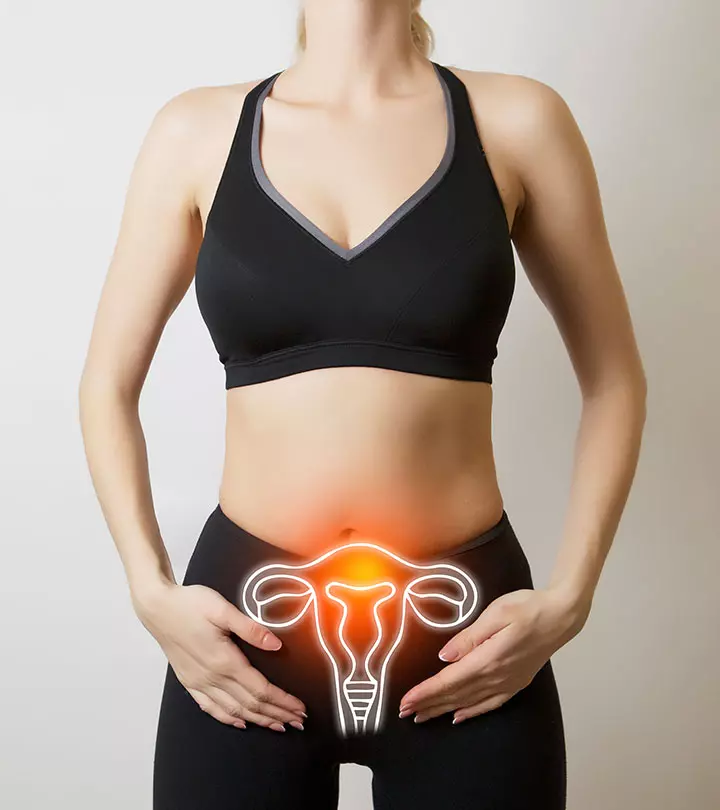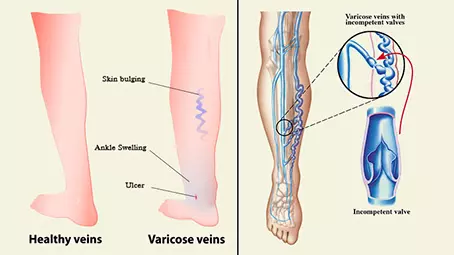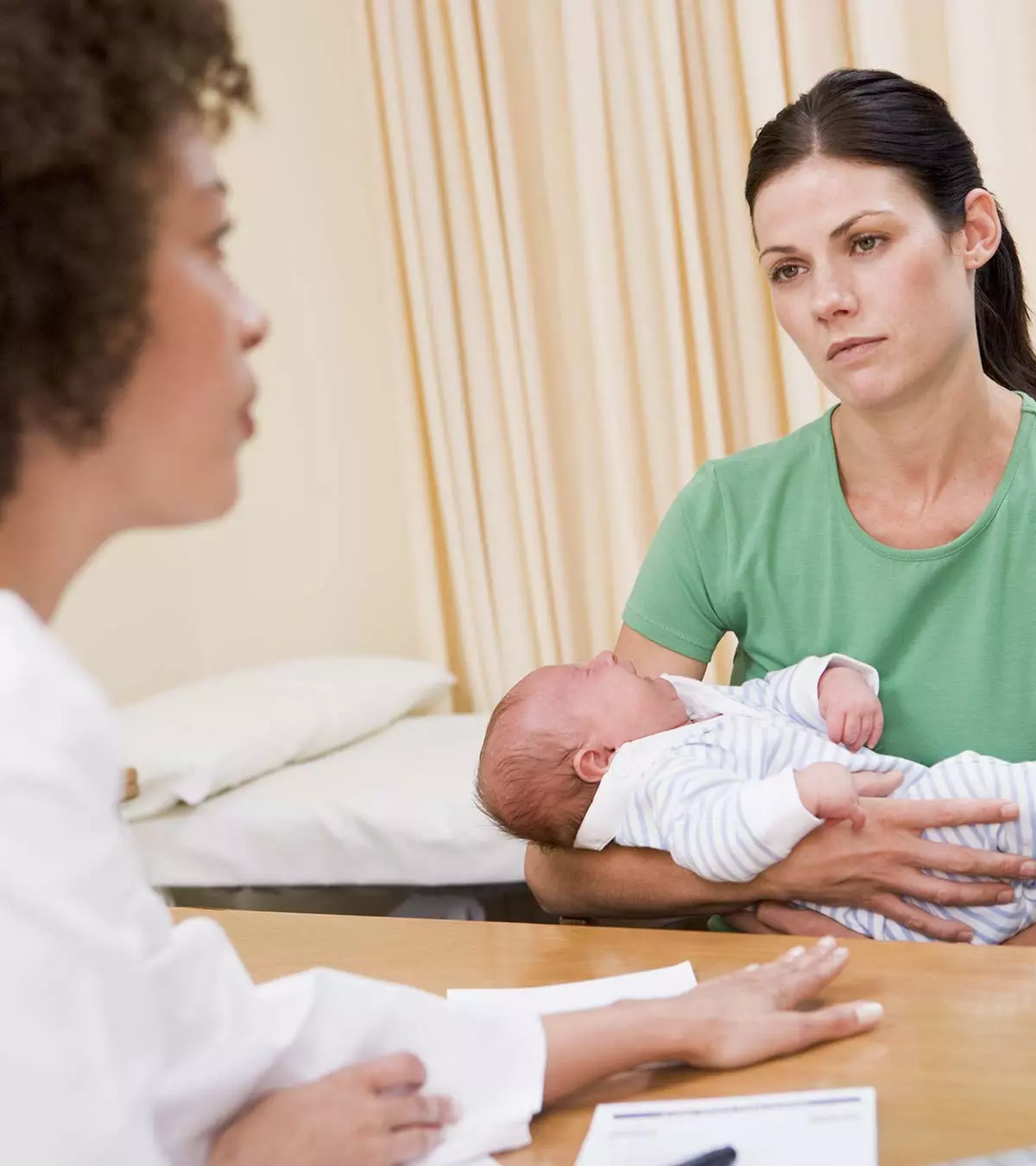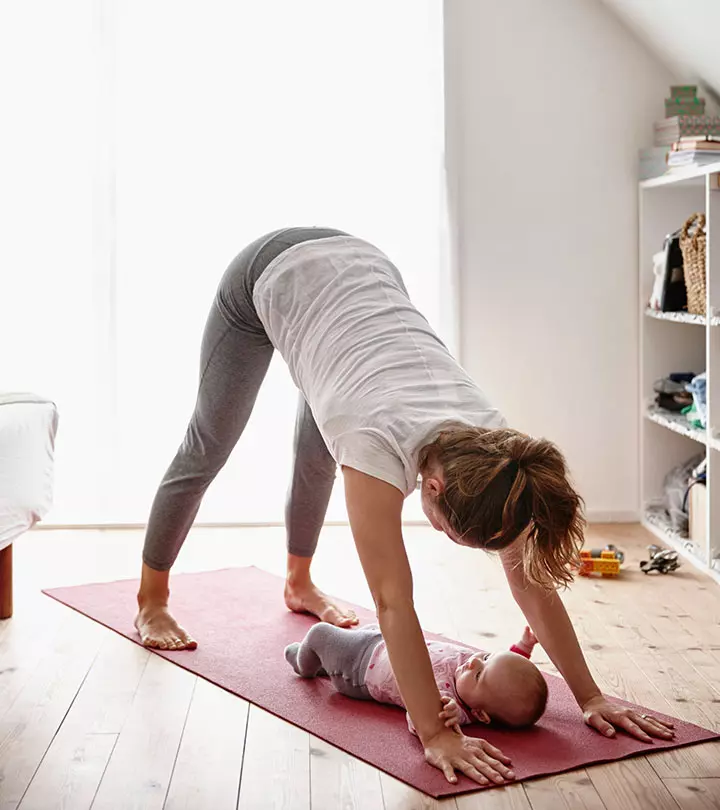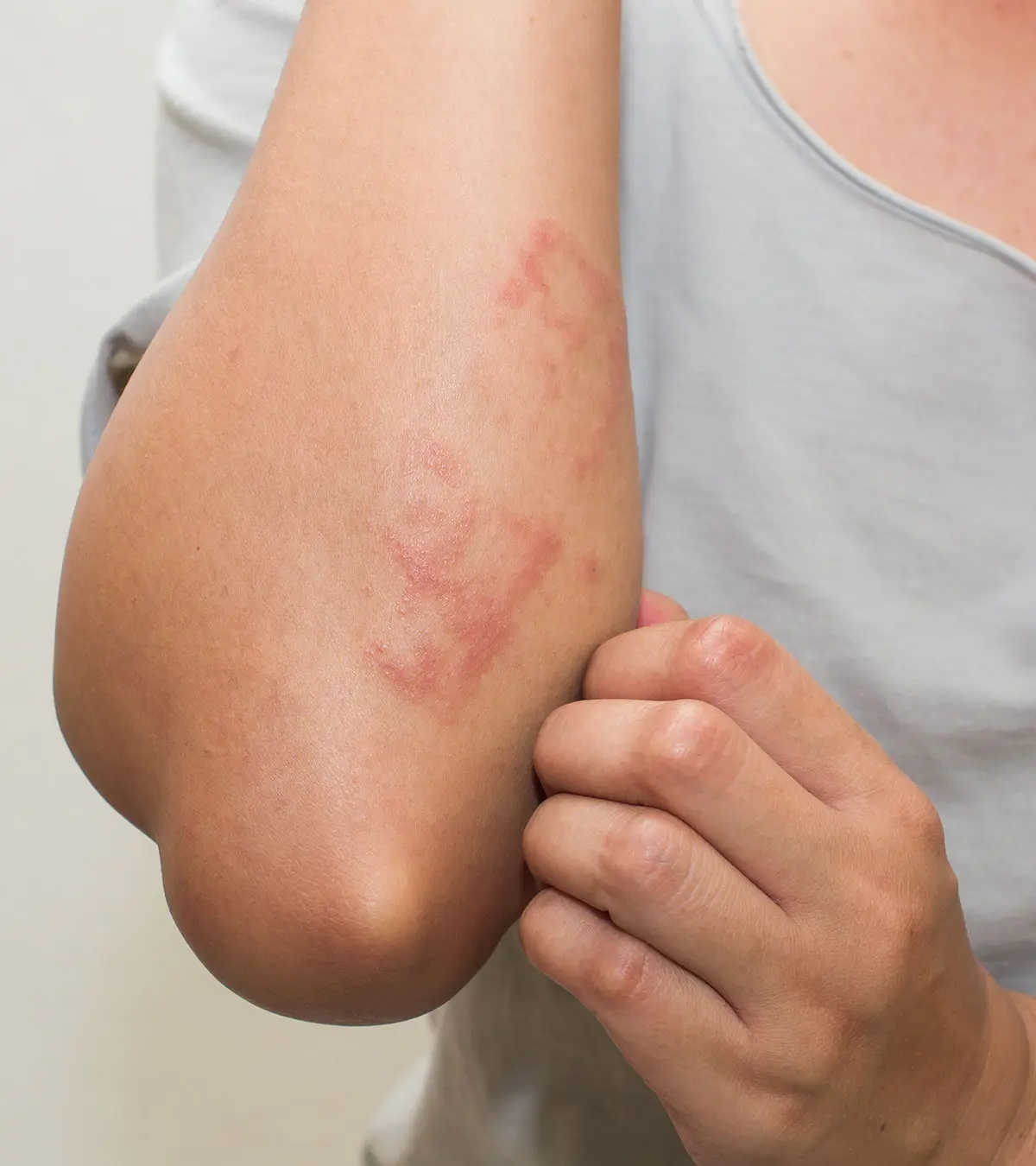
Image: ShutterStock
Postpartum hives or urticaria are skin rashes characterized by itchy, red, or skin-colored rashes on the skin. Sometimes, they develop a rough texture similar to eczemaiA skin condition characterized by dry, itchy, and inflamed skin (dermatitis). These occur when the body’s immune system comes in contact with allergens and produces histamineiA chemical produced by the immune system in response to allergic reactions. (from small capillariesiTiny blood vessels that connect arteries and veins throughout the body. ) and other chemicals into the blood. The histamine, in turn, bloats the blood vessels, releasing plasma into the skin. This fluid collects in the skin and causes inflammation and itchy rashes on its surface (1). Hives are also called weals, nettle rash, and welts and are commonly seen on arms, back, and feet (2). Read on the causes of hives after pregnancy, their symptoms, treatment options, and possible complications.
Key Pointers
- Itchy skin rashes called postpartum hives appear when the body’s immune system comes into contact with allergens.
- Hormonal changes, exposure to extreme heat or cold stress, certain illnesses, dietary sensitivities, insect bites, seasonal allergies, and some medications are common causes of postpartum hives.
- Women who are about 36 weeks pregnant or giving birth right away are most likely to get postpartum hives.
- Postpartum hives present with itchiness, swelling, pain, and a burning sensation.
- Wearing breathable clothing, avoiding triggers, using topical creams, and getting enough rest are ways to manage postpartum hives, which may go away on their own.
- Oatmeal baths, aloe vera, turmeric, and clove oil are natural treatments for postpartum hives.
- Having trouble breastfeeding, skin infections, and postpartum hives are potential problems.
What Are The Causes Of Hives After Pregnancy?
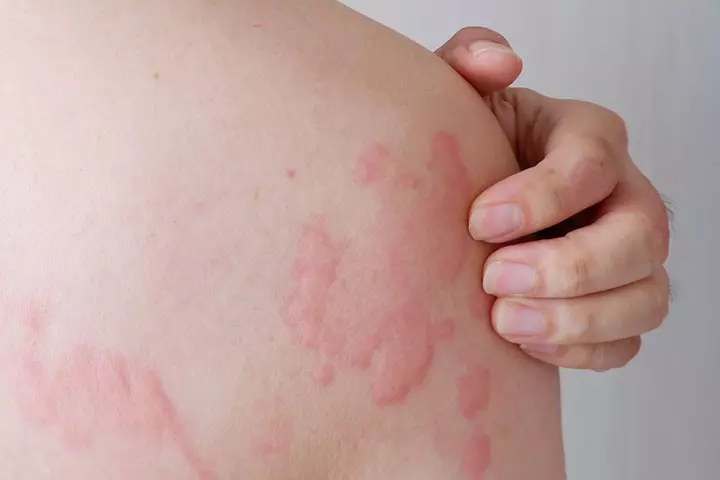
Postpartum hives are caused by changes in immune system cells due to effects of prolactin, a hormone that is produced during breastfeeding. These hives are itchy, raised bumps on the skin that occur after giving birth. Postpartum hives are not contagious and do not pose any risk to the baby (1).
Hormonal changes and stress could be the common causes of hives during pregnancy and immediately after birth. The other reasons that might trigger hives include (3):
- Acute medical conditions, such as thyroid (2)
- Mast cells (mast cell activation)
- Postpartum depression
- Certain medications, such as aspirin or penicillin
- Exposure to extreme heat (such as the sun) or cold conditions
- Seasonal allergies or environmental allergens
- Food allergies
- Insect bites or stings
- Autoimmune disease
- Family history
- Stress (4)
- Lack of sleep (5)
 Did you know?
Did you know?Are Hives Common After Pregnancy?
Dr. Anna Chacon, a board-certified dermatologist from Miami, Florida, says, “PostpartumiThe period that immediately follows childbirth. hives are most frequent in women at about 36 weeks or immediately following birth.” There are no studies to suggest how common hives are after pregnancy. Your chances of developing them postpartum, on exposure to triggers mentioned above, are the same as any other time. Anecdotal evidence suggests that hormonal fluctuations and stress after childbirth may increase the risk of hives postpartum, although that may not be the case for all women.
Suffering from urticaria before or during pregnancy may influence whether you develop it postpartum. A study analyzing 288 pregnancies of chronic urticaria (CU) patients from 13 countries found that after giving birth, women experienced urticaria symptoms. The report states, “ After giving birth, urticaria disease activity remained unchanged in 43.8% of CU patients, whereas 37.4% and 18.1% experienced worsening and improvement, respectively (5).
Kira, a mom, describes her experience with postpartum hives on her blog, ‘’They were everywhere. And they kept popping up across my chest, where my bra straps were, pants waistband, anywhere that fabric was touching me with pressure. The next day, I called my OBGYN first thing and got an appointment. During the appointment, my skin flared up more. Each of my breasts was a giant hive. They went around my back like giant burn marks almost. The OBGYN said she’d never seen anything like that, it wasn’t PUPPSiPruritic urticarial papules and plaques of pregnancy is an itchy, bumpy rash with raised patches that occurs mainly during late pregnancy , and recommended I see a dermatologist. He (the dermatologist) said they were hives and were common in the postpartum period and prescribed a regimen of Allegra and Tagamet (usually for heartburn, it is used to boost antihistamines) every 12 hours. I started the meds and saw a tiny bit of improvement (ⅰ).’’ She also mentions that avoiding over-stressing about hives helped her a lot.
A global meta-analysis done by multiple researchers indicated that chronic urticaria was prevalent in Northern America (0.1%), Europe (0.5%), Asia (1.4%), and Latin America (1.5%) with a higher incidence rate among women (1.3%) (6).
What Are The Symptoms Of Postpartum Hives?
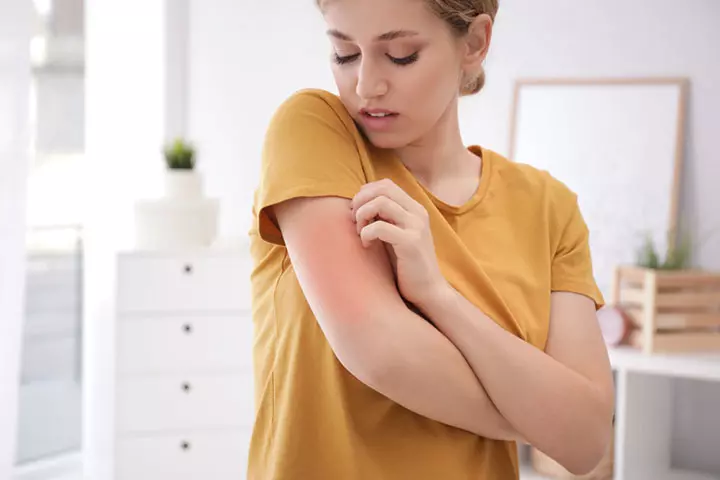
The general symptoms of hives may include any of the following (1):
- Itching, which may be severe
- Swelling of the skin surface with defined edges
- Pain or burning sensation
- Scaly skin
Hives may appear suddenly and clear within a few weeks. Postpartum hives are typically diagnosed by a healthcare provider through a physical exam of your skin. In some cases, a skin biopsy or blood test may be done to confirm an allergic reaction (1). However, allergy testing isn’t usually necessary for most cases of hives.
Alyssa, a mother and blogger shares her experience of developing postpartum hives just a day after giving birth to her daughter. She says, “ While in the hospital I started to notice that I was getting hives. At the time there were only about 4 and it wasn’t a big deal. They gave me something for the itchiness, I exchanged the hospital gown for my own nightgown, and we changed the linens on the hospital bed just in case it was something on the bed that was bothering my skin. As soon as we got home though the hives broke out absolutely everywhere. They covered my entire stomach, legs, chest, back, shoulders, neck, and arms. Essentially anything that wasn’t my face was covered in hives. They were even on my toes, hands, and fingers… I came to find out that I had postpartum hives. And again I had a very severe case. Though most women who do get postpartum hives don’t get them until a few weeks after delivery, I immediately traded my PUPPPS rash for the hives (ii).”
How To Deal With Hives Post Pregnancy?

Postpartum hives may not need any medical treatment as they resolve on their own. However, you might take some measures to get relief from itching, pain, or burning sensation. These measures may also help you develop a smooth breastfeeding pattern.
- Wear breathable and light clothing.
- Take enough rest to avoid stress and anxiety at bay.
- Avoid using harsh soaps, lotions, and detergents (for your clothes).
- Keep yourself hydrated.
- Place a humidifier or cold compress to soothe the affected skin region.
- Apply sunscreen lotion before going out in the sun and try to avoid triggers as much as possible.
- Use over the counter (OTC) topical creams that may soothe red and itchy bumps. Your doctor may prescribe a medicated cream or ointment, if necessary.
- Clove oil
- Icepack application
- Consult your doctor for antihistamines or corticosteroids
- Immunotherapy
If you have a severe reaction, especially with swelling in your throat, you may need an emergency injection of epinephrine (1).
Home Remedies You May Try For Postpartum Hives
Here are a few home remedies that are believed to provide relief from the discomfort caused by hives while breastfeeding.
- Oatmeal bath: The anti-inflammatory and soothing properties of oatmeal might give some relief from itching and swelling. Put one cup of oatmeal in a microfiber cloth and soak it in a bowl of hot water. Leave for about 10 to 15 minutes and add it to the bathtub. You may soak for around 15 minutes in this bath; following this regime every day might help (7).
- Aloe vera: Aloe vera is also known for its cooling effect on inflammation. Extract fresh aloe vera gel and apply it to the affected area (8). Leave for some time and wash with cold water.
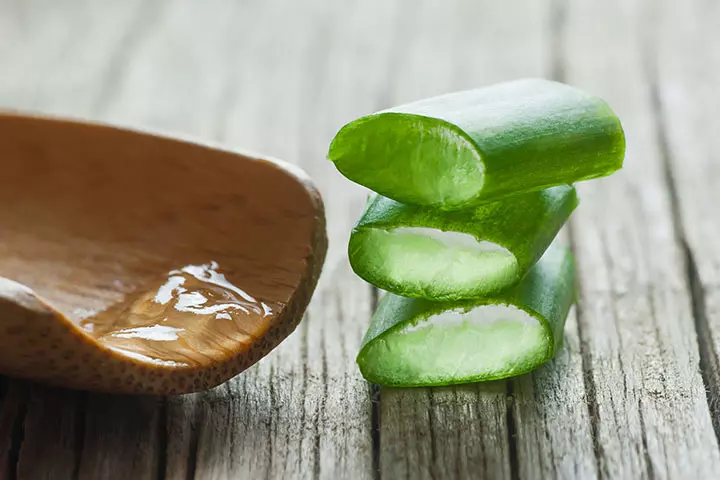
- Turmeric: Turmeric has anti-inflammatory properties (9). Add one teaspoon of turmeric to a glass of hot milk. You may add a pinch of black pepper powder and have it twice a day. However, there aren’t enough studies to support the efficacy of turmeric in dermatology.
- Chamomile tea: This could provide some relief from symptoms, such as inflammation, itching, and rash. Although there are no studies about its safety on postpartum women, there have not been any reports of its toxicity either (10). Take one tablespoon of dried chamomile in a cup of hot water. Allow it to steep for about five minutes, strain it, and have it once or twice a day.
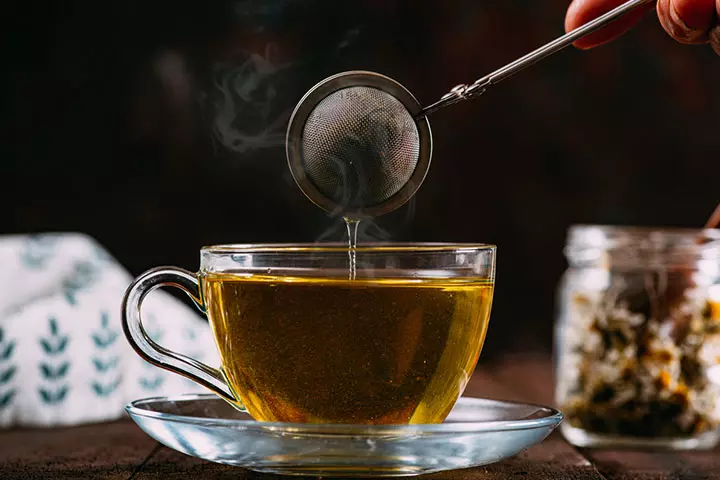
How Long Do Hives Last After Pregnancy?
Acute hives are likely to last for six weeks. But if they remain even after six weeks and become episodic over months and years, they are considered to be chronic (2) and require a doctor’s attention.
Possible Complications Of Postpartum Hives
Dr. Chacon recommends, “Consult a doctor if you experience signs of hypersensitivityiAn excessive immunological response to an allergen or antigen. , such as swelling of the lips, tongue, or throat or a serious allergic response.”
General complications of hives may include (1) (11):
- Anaphylaxis, a life-threatening allergic reaction that causes difficulty in breathing.
- Swelling of the throat that might cause blockage of airways.
 Quick tip
Quick tipNext, we address some commonly asked questions about hives after childbirth.
Frequently Asked Questions
1. Are postpartum hives contagious?
Hives may not be contagious unless they contain viruses that could be transmitted from one person to another. In general, they subside as you reduce your exposure to allergens or risk factors.
2. Can breastfeeding cause hives?
Some women who are prone to allergies are likely to experience milk ejection reflex while breastfeeding. This condition could result in symptoms such as redness, itching, rash, and hives on the chest, arms, and legs (13).
3. Where do hives usually start?
Hives may begin from anywhere on the body, can change shapes or location, or disappear and reappear within a short period of time (14).
4. Do hives spread by scratching?
Hives themselves do not spread through physical contact or scratching, but the underlying cause of the hives may be contagious. Scratching the affected area can worsen the symptoms associated with hives (15).
5. Can postpartum hives affect breastfeeding?
Postpartum hives may not directly interfere with breastfeeding, but they can make nursing uncomfortable for you. The itchy, raised welts may cause distress and discomfort and affect your ability to relax during feeding sessions.
6. How can I prevent postpartum hives?
Identifying and avoiding known triggers, such as certain foods or environmental factors, may help reduce the risk of postpartum hives. Managing stress through relaxation techniques or gentle exercise may also help, as stress is a common trigger for hives. Additionally, maintaining overall skin health by staying hydrated and using gentle, non-irritating skincare products may reduce the likelihood of outbreaks.
You may experience postpartum hives if exposed to any triggers, stress, or because of hormonal fluctuations. Though they are usually self-resolving and are not a cause for concern, you may get evaluated by your healthcare professional if you spot abnormal, multiple rashes on your body. Also, if you suspect that you could have developed hives after pregnancy due to some allergic reaction, you may avoid exposure to these allergens to prevent the recurrence of hives. Meanwhile, you may try some home care measures to get relief from the symptoms.
Infographic: What Are The Medical Treatments For Postpartum Hives?
Postpartum hives usually go away within a few weeks without complications. Some women may not require any treatment or can manage hives with home remedies. However, medications are often needed if symptoms such as itching are present with hives. Go through the infographic to learn about medical treatments for postpartum hives Illustration: Momjunction Design Team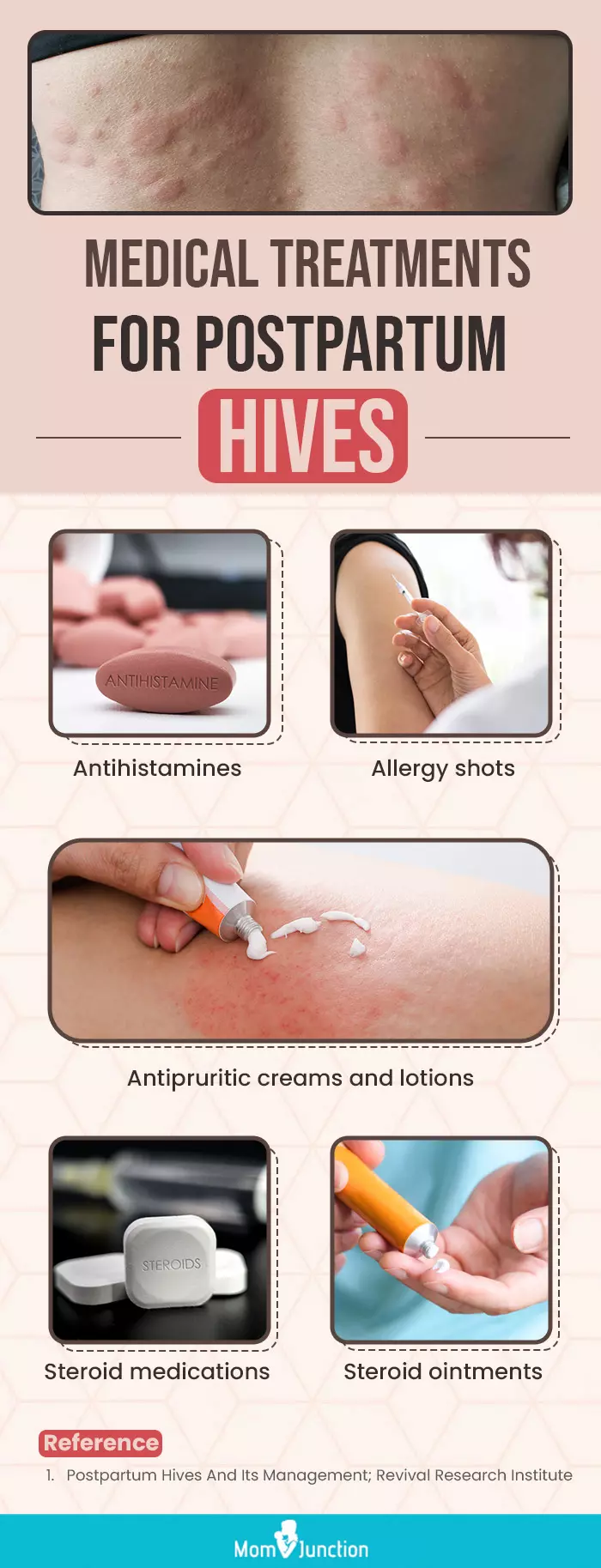
Illustration: Postpartum Hives: Causes Symptoms Treatment And Remedies
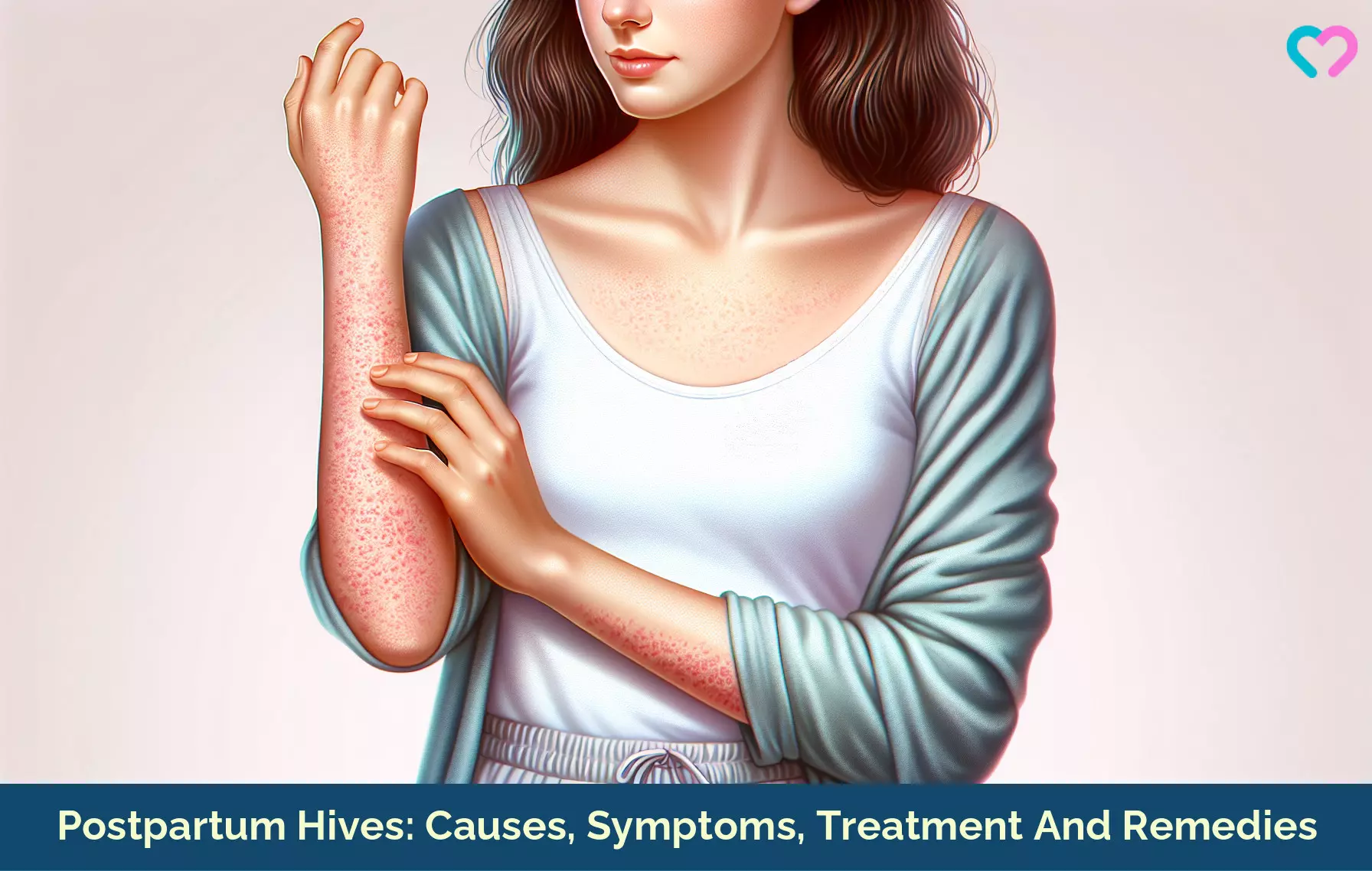
Image: Dalle E/MomJunction Design Team
Get hold of effective methods for managing hives while breastfeeding through this informative video. Gain insights on alleviating your infant’s skin irritation and minimizing their discomfort.
Personal Experience: Source
MomJunction articles include first-hand experiences to provide you with better insights through real-life narratives. Here are the sources of personal accounts referenced in this article.
ⅰ. Postpartum hives.https://kroboths.blogspot.com/2012/04/postpartum-hives.html
ii. PUPPPS, Postpartum Hives, and Recovery.
https://petitefoxdesigns.wordpress.com/2015/08/24/parenting-update-1-month-old/
References
- Hives.
https://medlineplus.gov/ency/article/000845.htm - S J Deacock; (2008); An approach to the patient with urticaria.
https://pmc.ncbi.nlm.nih.gov/articles/PMC2492902/ - Hives (urticaria).
https://www.health.harvard.edu/diseases-and-conditions/hives-urticaria-a-to-z - Postpartum Rash: Causes, Duration, and Solutions.
https://revivalresearch.org/blogs/postpartum-rash-causes-duration-and-solutions/ - Emek Kocatürk et.al; (2021); Effects of pregnancy on chronic urticaria: Results of the PREG-CU UCARE study.
https://onlinelibrary.wiley.com/doi/10.1111/all.14950 - Julia Fricke et.al; (2019); Prevalence of chronic urticaria in children and adults across the globe: Systematic review with meta-analysis.
https://onlinelibrary.wiley.com/doi/10.1111/all.14037 - Caring for Yourself During Pregnancy and Beyond.
https://obgyn.ucsf.edu/sites/obgyn.ucsf.edu/files/Preg%20Guidebook_whrc_Aug2016_0.pdf - Amar Surjushe et.al; (2008); ALOE VERA: A SHORT REVIEW.
https://pmc.ncbi.nlm.nih.gov/articles/PMC2763764/ - Soham P Chaudhari et.al;(2015); Curcumin: A Contact Allergen.
https://pubmed.ncbi.nlm.nih.gov/26705440/ - Janmejai K Srivastava et.al;(2010); Chamomile: A herbal medicine of the past with bright future.
https://pmc.ncbi.nlm.nih.gov/articles/PMC2995283/ - Understanding Hives (Urticaria).
https://myhealth.ucsd.edu/3,90190 - Hives.
https://www.pennmedicine.org/for-patients-and-visitors/patient-information/conditions-treated-a-to-z/hives#:~:text=Possible%20Complications - Gennaro Liccardi et.al; (2013); Oxytocin: an unexpected risk for cardiologic and broncho-obstructive effects, and allergic reactions in susceptible delivering women.
https://pmc.ncbi.nlm.nih.gov/articles/PMC4014859/ - Hives.
https://acaai.org/allergies/allergic-conditions/skin-allergy/hives/ - Hives.
https://allergyasthmanetwork.org/allergies/hives/
Community Experiences
Join the conversation and become a part of our nurturing community! Share your stories, experiences, and insights to connect with fellow parents.
Read full bio of Subhashis Samajder
- Dr. Anna H. Chacon is a board-certified dermatologist and author originally from Miami, Florida. She has authored over a dozen peer-reviewed articles, book chapters and has been published in JAAD, Archives of Dermatology, British Journal of Dermatology, Cosmetic Dermatology, and Cutis. An alumnus of Brown University, Dr. Chacon has over 7 years of experience and works as a tele dermatologist.
 Dr. Anna H. Chacon is a board-certified dermatologist and author originally from Miami, Florida. She has authored over a dozen peer-reviewed articles, book chapters and has been published in JAAD, Archives of Dermatology, British Journal of Dermatology, Cosmetic Dermatology, and Cutis. An alumnus of Brown University, Dr. Chacon has over 7 years of experience and works as a tele dermatologist.
Dr. Anna H. Chacon is a board-certified dermatologist and author originally from Miami, Florida. She has authored over a dozen peer-reviewed articles, book chapters and has been published in JAAD, Archives of Dermatology, British Journal of Dermatology, Cosmetic Dermatology, and Cutis. An alumnus of Brown University, Dr. Chacon has over 7 years of experience and works as a tele dermatologist.
Read full bio of Rebecca Malachi
Read full bio of Swati Patwal
Read full bio of Aneesha Amonz










